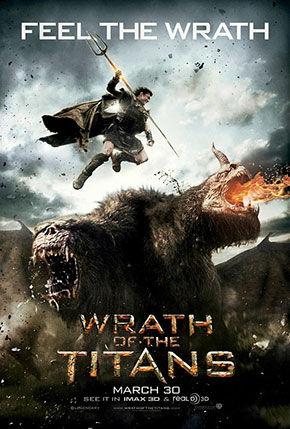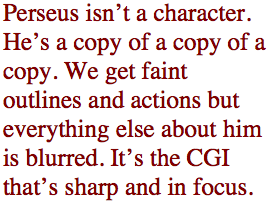
Baseball's Active Leaders, 2023
What Trump Said When About COVID
Recent Reviews
Everything Everywhere All at Once (2022)
Black Panther: Wakanda Forever (2022)
Doctor Strange in the Multiverse of Madness (2022)
Spider-Man: No Way Home (2021)
The Cagneys
A Midsummer Night's Dream (1935)
Something to Sing About (1937)
Angels with Dirty Faces (1938)
A Lion Is In the Streets (1953)
Man of a Thousand Faces (1957)
Never Steal Anything Small (1959)
Shake Hands With the Devil (1959)
Wrath of the Titans (2012)
WARNING: SPOILERS
Is there some cinematic law whereby the more lifelike the mythological creatures the less lifelike the human counterparts? The greater the special effects, the lesser the story? Let’s call it Michael Bay’s law.
There’s no Kraken that can be released in “Wrath of the Titans,” but we do get fire-breathing lion-dragons, giant cyclopses, and—finally!—the titular titans, which appear to be whirling devil dervishes that land as meteors and battle Greek forces with two or three bodies on one trunk. While whirling. It’s actually pretty cool.
The main villain, meanwhile, isn’t Ralph Fiennes as in the first movie, but his father, Kronos, who is portrayed as a giant lava man that growls. He’s CGI. And he erupts and he fulminates and he takes out dozens of lesser characters, but there’s no personality there. There’s no there there. What’s his goal? Revenge upon his sons, who imprisoned him? Then why does he take out dozens of Greek soldiers but miss Zeus and Hades? And why are they humanoid while he’s, you know, a giant lava man? Basically he serves the function of the Kraken in the first movie. We hear about him, and hear about him, and then he appears, giant and monstrous, and causes chaos for a minute or two; then Perseus (Sam Worthington) unleashes the necessary weapon—Medusa’s head in the first movie, the combined weapons of Zeus, Poseidon and Hades in this one—and takes him out in like 10 seconds. You blink and it’s over. Crisis averted. Except for the crisis in popular cinema. The movie is like a trip to hell and back.
Perseus, the demigod, last seen killing the Kraken, is living a simple life as a single father to a 10-year-old boy, Helius (John Bell), and as a humble fisherman, on the Greek coast. His wife, Io (Gemma Arterton), died between movies. We see him genuflecting by her tombstone. It reads: “I’m not doing the sequel. I can’t go into it. I’m just not.”
Then up pops biological Dad Zeus (Liam Neeson), who confesses that with people praying less, the gods are weakening. This means all of their work is being undone, including the underworld prison Tartarus, which holds both titans and Kronos. And if they escape? “The end of the world,” he intones.
Perseus shrugs and goes back to fishing and gazing with pride and love at his son. End of the world, schmend of the world. He doesn’t connect “end of the world” to his world until a two-headed dragon shows up and threatens his son. Then it’s off to battle.
Too late. Another disgruntled, jealous son of Zeus, Ares (Edgar Ramirez of “Carlos”), along with Hades (Ralph Fiennes), who has never forgiven his brother for condemning him to the underworld, have teamed up with Kronos, the giant lava man, and taken Zeus captive. He’s chained in the underworld now. His arms are slowly turning to lava while his hair is quickly turning white.

The task? Gather all the demigods in the world for a frontal assault on Hades. Sorry, that’s not it. That would make sense. No, he’s instructed to gather just one demigod, the half-human son of Poseidon, Agenor (Toby Kebbell, who is our comic relief but isn’t funny), along with a more battle-ready Andromeda (Rosamund Pike taking over for Alexa Davalos), plus a few meaningless others, and, with this rag-tag team, travel to a distant island to battle giant cyclopses and get Hephaestus (Bill Nighy), the architect of Tartarus, to hand out blueprints. Unfortunately, at the last second, Ares arrives and kills all but Perseus, Andromeda and Agenor, who, together, stumble, for what seems like an eternity, toward hell.
Meantime, in hell, Hades and Zeus are bonding. I guess they just needed quality time together.
The big battle takes place on Earth. Kronos erupts, here come the Titans, and the Greek forces (HOO-ah!), along with Agenor and Andromeda, and eventually Zeus and Hades battling side by side, do their best to hold them back, while on the Mount of Idols, Perseus fights Ares to get the final weapon with which to destroy Kronos.
Early in the movie Zeus tells Perseus, “You will learn that being half human makes you stronger than a God.” Then he adds, “not weaker,” so we know what stronger means.
But it’s total bullshit. On the Mount of Idols, Ares, a full god, kicks Perseus’ ass. It’s not even close. He could break him in two. Why doesn’t he? It’s not in the story. Perseus has to become the underdog before he can win. He has to overcome great odds, and even greater pain, to become the demigod version of Rocky Balboa or John McClane. Because that’s what we want. We want the folks—like us, we imagine—who keep coming and coming despite the odds. Perseus isn’t a character. He’s a copy of a copy of a copy. We get faint outlines and actions but everything else about him is blurred. It’s the CGI that’s sharp and in focus.
On the IMDb boards, people are asking if this movie is better than “Clash of the Titans,” which has to be one of the saddest questions ever. Is it smarter than George W. Bush? Does it taste better than poop? Do I like it more than banging my head with a hammer? The sadder answer? “Clash of the Titans” was horrible but “Wrath” is worse. At least in the first we had Mads Mikkelsen and Liam Cunningham. They added something. This one gives us uncomic comic relief, a battle-ready Andromeda who can’t battle, and a Perseus who forgets his entire raison d’etre from the first movie. In that film, Hades killed his adopted parents and sister, and Perseus burns to take him out. He has the chance here. Zeus is dead, Hades is weak, Perseus eyes him. With revenge? Will he take him out now? Will he even reference his raison d’etre from the first movie? No. “All my power is spent,” Hades says. “Who knows? I might be stronger without it.” Then he walks away. Perseus watches him and smiles.
Oh, Hades, you old so and so. Nothing will keep you down, will it?
Then Perseus goes and kisses Andromeda. Because he’s supposed to. He’s a copy of a copy of a copy.
The era of the gods is ending, we’re told in “Wrath of the Titans,” but it’s also true of our movie gods. We have characters by committee and corporation now. They’re copies of copies of copies of copies. Pray for them.
—March 31, 2012
© 2012 Erik Lundegaard







